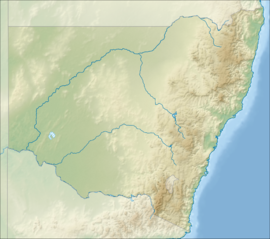Marramarra National Park
| Marramarra National Park New South Wales | |
|---|---|
IUCN category II (national park) | |
 View of Berowra Creek from Marramarra National Park | |
| Nearest town or city | Sydney |
| Coordinates | 33°31′30″S 151°03′28″E / 33.52500°S 151.05778°ECoordinates: 33°31′30″S 151°03′28″E / 33.52500°S 151.05778°E |
| Established | 28 December 1979[1] |
| Area | 117.85 km2 (45.5 sq mi)[1] |
| Managing authorities | NSW National Parks & Wildlife Service |
| Website | Marramarra National Park |
| See also | Protected areas of New South Wales |
Marramarra National Park is a protected national park that is located in the Hawkesbury region of northwestern Sydney, New South Wales, in eastern Australia. The 11,785-hectare (29,120-acre) national park is situated approximately 40 kilometres (25 mi) northwest of the Sydney central business district.
Description[edit]
The park is bounded by the Hawkesbury River in the north; Berowra Creek in the east; and private land to the south and west. The national park may be accessed from Wisemans Ferry via the Old Northern Road or from Hornsby via the Galston Road through the Galston Gorge.[2]
The park is administered by Ku-ring-gai Chase National Park. It offers bushwalkers a wide range of environments, from the mangrove communities along Marramarra Creek to the drier, sclerophyll scrub along the ridges. Access is provided predominantly by fire trails and service roads, frequently alongside power lines, with no dedicated walking tracks.
Gallery[edit]
Bibliography[edit]
- Treks in New South Wales, Neil Paton (Kangaroo Press) 1986, ISBN 0-86417-079-3
See also[edit]
References[edit]
- ^ a b "Marramarra National Park: Park management". Office of Environment and Heritage. Government of New South Wales. Retrieved 5 October 2014.
- ^ "Marramarra National Park". Office of Environment and Heritage. Government of New South Wales. Retrieved 5 October 2014.
| Wikimedia Commons has media related to Marramarra National Park. |
External links[edit]
- "Marramarra National Park, Muogamarra National Park and Maroota Historic Site: Plan of management". NSW National Parks & Wildlife Service (PDF). Government of New South Wales. 14 December 1998. ISBN 0-7310-7694-X.
- "Marramarra National Park". NSW National Parks & Wildlife Service (Map). Government of New South Wales. Archived from the original on 6 October 2014.
- "Marramarra National Park". Office of Environment and Heritage. Government of New South Wales.
- "Marramarra National Park". NSW National Parks & Wildlife Service. Government of New South Wales.
- "Trail rides in Marramarra National Park". Northern Beaches Mountain Biking Group.
- Niall Clugston (Hornsby Shire Library) (2008). "Marramarra National Park". Dictionary of Sydney. Retrieved 28 September 2015. [CC-By-SA]
| This New South Wales protected areas related article is a stub. You can help Wikipedia by expanding it. |






No comments:
Post a Comment